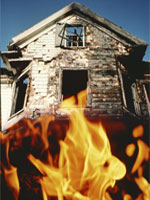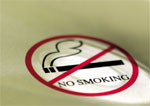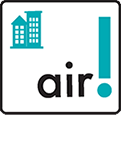Reduce Damage and Costs: Smell, stains on walls, burns in carpets and countertops, and more smell. These are the major issues that landlords experience when tenants smoke. Landlords can reduce the effort and expense of cleaning up after tenants who smoke indoors by regulating smoking in their buildings.
 Smoking restrictions are one of the easiest ways to reduce damage to your units and reduce your turnover costs. Such a policy protects your property from smoke-related damages and reduces the risk of fires. You will save money on turnover costs because smokefree apartments cost less to clean, repair, and repaint. Smoking restrictions will keep your units in better condition, making them more attractive to prospective tenants, or to buyers if you ever decide to sell.
Smoking restrictions are one of the easiest ways to reduce damage to your units and reduce your turnover costs. Such a policy protects your property from smoke-related damages and reduces the risk of fires. You will save money on turnover costs because smokefree apartments cost less to clean, repair, and repaint. Smoking restrictions will keep your units in better condition, making them more attractive to prospective tenants, or to buyers if you ever decide to sell.
“The smoke permeates the walls and the drapes and it’s very difficult to get the odor out without fumigating.”
“The windows are dripping with yellow, it’s disgusting.”
“The smell is so hard to get out, we have to use vanilla-scented paint.”
“Even if you use primer-sealer, it can still bleed through. We’ve used an ozone machine, the whole bit; it stays there. I’ve had to do four coats of primer.”
In addition to the smell and stains, there is permanent damage caused by careless stubbing out of butts and cigarettes left burning.
“You find cigarette burns in the carpet, the vinyl, the countertops. It does a lot of damage.”
“We found butts everywhere, burns all over the carpet. It was horrible.”
*Source for quotes: Focus Group Summary Report: Opinions of Experienced Metro-Area Landlords Regarding Smoking Policies & Practices (research conducted with landlords in Clackamas, Multnomah, and Washington County, Oregon and Clark County, Washington), Nov. 2006, available at http://smokefreeoregon.com/housing/pdf/CDRI_SummaryReport.pdf.
 Smoking restrictions will help you attract and retain tenants. Smoking restricted housing is an exciting market opportunity for landlords. Many landlords say that smoking restrictions help them attract and keep tenants who take better care of their units. How often do you get an opportunity to make money while doing something good for the health of your community?
Smoking restrictions will help you attract and retain tenants. Smoking restricted housing is an exciting market opportunity for landlords. Many landlords say that smoking restrictions help them attract and keep tenants who take better care of their units. How often do you get an opportunity to make money while doing something good for the health of your community?
Strong market demand for smoking restricted housing: You will also gain a market advantage. As more people become aware of the health hazards of secondhand smoke, smoking restrictions are an amenity that most tenants want.
Many landlords agree they have no problem renting out their non-smoking units. Frankly, they acknowledge the reality of what the earlier tenant research also indicates: offering non-smoking appears to provide a competitive advantage.
“We have a wait list.”
“We had an entire building lease up in just 30 days, because people were calling specifically for non-smoking units.”
Some, but not all, report that prospective tenants are specifically asking for non-smoking. “Non-smoking is another amenity that we offer to attract people.”
Landlords also note that the smell of a smoking unit can turn away prospective tenants: “It’s like buying a used car — if it smells like smoke you’re not going to buy it.”
Many landlords find that smokers as well as non-smokers want to live in non-smoking units.
“It seems like most of my tenants are smokers, but they still want non-smoking units.” One long-time no-smoking landlord concludes that today, unlike what might have been true in the past, there are no financial risks to going nonsmoking.
*Source for quotes: Focus Group Summary Report: Opinions of Experienced Metro-Area Landlords Regarding Smoking Policies & Practices (research conducted with landlords in Clackamas, Multnomah, and Washington County, Oregon and Clark County, Washington), Nov. 2006, available at http://smokefreeoregon.com/housing/pdf/CDRI_SummaryReport.pdf.
Apartments leading the way in Maryland
 In 2006, First Centrum, LLC announced its new smoke-free policy for all residents of First Centrum Communities apartment homes in a press release. “We are pleased to be able to help protect the health and improve the lives of our residents and to enhance the atmosphere of our buildings at the same time,” states Rob Couch, President of Centrum Management, LLC, which provides direct management, as well as third party oversight for the communities involved in the transition.
In 2006, First Centrum, LLC announced its new smoke-free policy for all residents of First Centrum Communities apartment homes in a press release. “We are pleased to be able to help protect the health and improve the lives of our residents and to enhance the atmosphere of our buildings at the same time,” states Rob Couch, President of Centrum Management, LLC, which provides direct management, as well as third party oversight for the communities involved in the transition.
Renters prefer buildings with smoking restrictions
- Three-quarters would rather live in a smoking-restricted building, “other things being equal.”
- 52% would even pay extra rent to live in a smoking-restricted building.
- 42% would feel uncomfortable renting a unit next door to a smoker.
- Three-quarters say it’s okay for landlords to prohibit smoking inside rental units to keep secondhand smoke from drifting into other units.
- Only 26% currently live in a building with smoking restrictions.
- More than a third of renters in multi-unit buildings are regularly exposed to a neighbor’s secondhand smoke.
- Most renters don’t smoke and many smokers smoke outside their units.
- Three-quarters of renters don’t smoke at all.
- 19% of renters smoke daily—but only 11% of renters smoke inside on a regular basis (7% daily; 4% monthly or more).
Source: Smoke-Free Housing Project, A Landlord’s Guide to No-Smoking Policies, available at http://smokefreeoregon.com/housing/pdf/Landlord’s%20Guide%20to%20No-Smoking%20Policies%20rev.%206-07.pdf (2006).
Fire prevention:
The number one cause of fire fatalities in Maryland is cigarette-related fires.
Smoking is the #1 cause of residential fires in Maryland, causing more injuries, more deaths, and more expensive property damage than most other types of fires.
- In 2007, careless smoking caused more fire deaths than fires resulting from other causes. Fourteen cigarette-related fires claimed 25 fire victims, ranging in age from 2 years old to 28 years old. All 14 fires occurred in residential structures.
- In 2006, three out of four Montgomery County residential fire fatalities were caused by smoking materials and involved senior citizens over the age of 78.
- In Maryland, the fatality rate due to smoking is much higher than the national average – in 2007, cigarette-related fires caused 27% of all fire deaths in Maryland.
 Landlords universally recognize the liabilities and hazards of having an indoor smoker as a resident. “I’ve had two places burn down because of cigarettes,” noted one landlord.
Landlords universally recognize the liabilities and hazards of having an indoor smoker as a resident. “I’ve had two places burn down because of cigarettes,” noted one landlord.
Nationally, smoke alarms operated in only 43% of fires in which a fatality occurred. This is of concern since more than 90% of all residences are equipped with smoke alarms. (http://www.usfa.dhs.gov/downloads/pdf/tfrs/v5i5.pdf)
Cigarette-caused fires are almost exclusively residential, and residential fires are among the most dangerous type that firefighters confront. “Fewer cigarette-caused fires means fewer opportunities for firefighters to risk life and limb when answering calls.”
You own the building. This is your property and you have the right to set reasonable rules that protect your building. You know that you may lawfully regulate tenant behavior that impacts other tenants or presents a risk to the unit or building: pet policies, noise restrictions, prohibition on water beds, occupancy limits, restrictions on grilling, and more. With that power, you may restrict smoking on your property, even inside individual units.
Tenants do have rights relevant to the smoking issues—the right to be free from smoke infiltration from a neighboring unit if that infiltration rises to the level of a nuisance or a breach of the warranty of quiet enjoyment or habitability. In fact, non-smokers with serious breathing disabilities or smoke allergies may have legal protection under the Americans with Disabilities Act (ADA) and the Fair Housing Act (FHA). Landlords may be obligated to take reasonable steps to ameliorate harm to such an individual.
Smoking is not a disability. Indeed, case law makes it clear that a tenant who smokes may not invoke the ADA in an effort to gain permission to smoke indoors because “Congress could not possibly have intended the absurd result of including smoking within the definition of ‘disability,’ which would render somewhere between 25% and 30% of the American public disabled under federal law because they smoke. In any event, both smoking and ‘nicotine addiction’ are readily remediable . . . . If the smokers’ nicotine addiction is thus remediable, neither such addiction nor smoking itself qualifies as a disability within the coverage of the ADA, under well-settled Supreme Court precedent.” See Brashear v. Simms, 138 F. Supp. 2d 693, 694-95 (D. Md. 2001) (“[A]ssuming that the ADA fully applies in this case, common sense compels the conclusion that smoking, whether denominated as ‘nicotine addiction’ or not, is not a ‘disability’ within the meaning of the ADA.”).
Because smoking is not a disability, it cannot be used as a reason to ask for accommodations. Smoking is not an acceptable way to treat or medicate any health conditions, including mental illness. It is much more likely that requests for reasonable accommodations will be made by non-smokers with medical conditions that are worsened by secondhand smoke. Tenants with disabilities may have legal protections from exposure to secondhand smoke under the Americans with Disabilities Act and the Fair Housing Act.
According to the U.S. Department of Housing and Urban Development (HUD), landlords offering Section 8 housing may restrict smoking in individual units as long as the policy is not used to target a protected class or minority. Landlords may be required to “grandfather” current smoking tenants until lease renewal.
 Once you implement a policy, smoking will be noticeable by other residents and your staff, and you are likely to hear about smoking violations. Enforcing a smoking policy is a lot less of a headache than mediating disputes between smokers and non-smokers without a policy in place. Experienced landlords use a variety of strategies to enforce their smoking restrictions. Here are some suggestions:
Once you implement a policy, smoking will be noticeable by other residents and your staff, and you are likely to hear about smoking violations. Enforcing a smoking policy is a lot less of a headache than mediating disputes between smokers and non-smokers without a policy in place. Experienced landlords use a variety of strategies to enforce their smoking restrictions. Here are some suggestions:
- Advertise your units as subject to indoor smoking restrictions; this attracts tenants who either don’t smoke or smoke only outside.
- Describe the smoking restrictions fully in your lease agreement, and talk to your tenants about these restrictions when you show the property and when tenants sign the lease. Require tenants to initial the provision.
- Post signs in the building and on the property.
- Tell tenants that if they smoke in their units, they will be financially responsible for bringing the unit back to condition, which could cost thousands of dollars.
- Have a system of warnings, fines, and evictions for failing to follow the smoking rule just like any other rule.
- Visit the properties regularly and perform inspections.
- Provide a designated smoking area outside, away from windows and doors.
Yes. As of July 31, 2018, all public housing agencies are legally required to prohibit lit tobacco products (cigarettes, cigars, pipes, and hookahs) in all living units, indoor common areas, administrative offices, and all outdoor areas within 25 feet of housing and administrative office buildings. Although not a requirement, public housing agencies are legally able to include electronic smoking devices in their smoke-free policies. Download the HUD Smoke-free Policy in Public Housing Guidebook for more information.
Smoking restrictions appeal to people from all walks of life. While it is true that smoking prevalence is low among people with higher incomes and education levels, most people don’t smoke no matter what their background. Many lower income people have children, are elderly, or are disabled, and these groups are particularly vulnerable to the health hazards of secondhand smoke and may be especially interested in finding smoking restricted housing.
